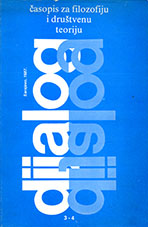VUKOV RJEČNIK KAO IZVOR SAZNANJA O STAROJ SRPSKOJ PROŠLOSTI
VUK KARADŽIĆ'S DICTIONARY AS A SOURCE OF INFORMATION ON ANCIENT SERBIAN PAST
Author(s): Vojislav MaksimovićSubject(s): Language and Literature Studies
Published by: Akademija Nauka i Umjetnosti Bosne i Hercegovine
Summary/Abstract: The author made an attempt to observe Vuk Karadžić's Serbian Dictionary as a work of a very complex contents and asignment, offering much information, so that it has elements of an encyclopedic lexicon. Regardless of its clear linguistic basis, this book (first published in 1818, and then in 1852) included many various themes and topics, so that it reflects the overall Serbian folk life, folk past, spirit and customs, and lifes and times of some other South Sla (Croats, Montenegrins and Moslems). Bearing in mind the broad character of Serbian Dictionary, Maksimović, however, reduced his research to only one aspect, expressed in the question: To what extent is Serbian Medieval period reflected in this work directly or indirectly? Giving many examples, the author singled out those elements that are represented to the greatest extent in Vuk Karadžić's Serbian Dictionary. These are, above all, legends and stories, monasteries and churches, towns and fortresses, major historic events and persons, folk and religious cutoms, agriculture and cattle raising, books in handwriting (srbulja), frescos and »stećaks« (Medieval standing tombstones), heroic folk poems and tales. In addition to all this, Vuk Karadžić pointed out in his dictionary some other aspects of folk creativity, expressed in architecture, school system and economy. Thus, the author concludes, Vuk Karadžić gave his book a form of a very interesting and useful work.
Journal: Dijalog - Časopis za filozofiju i društvenu teoriju
- Issue Year: 1987
- Issue No: 03+04
- Page Range: 2278-234
- Page Count: 8
- Language: Serbian

